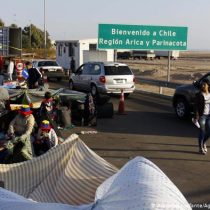
While the topic of conversation on the streets of Chile revolves these days around “Apruebo” or “Rejection” for a new Magna Carta through the plebiscite, a controversial immigration law, criticized by the opposition and civil society, is about to be realized in the Legislative of that South American country.
The bill proposed by Chilean President Sebastián Piñera, which originated during his first term (2010-2014), aims to tighten borders and mitigate the growing wave of irregular immigration, which increased after the closure of borders, decreed in March by the authorities to prevent the spread of the new coronavirus.
In its third constitutional phase, the lower house last week approved most proposals for the project, which contains more than 180 articles, but no consensus was reached on 10 of them, which will now have to be reviewed by a joint commission.
“We reject this bill, because it goes against human rights. A communication campaign of hatred and rejection of immigrants was made, which caused little involvement of the civilian population in the process,” explains in an interview with Deutsche Welle Patricia Loredo of the Chilean collective without borders organization. Chile required, the Peruvian activist, a migration law in line with current migration flows, and the international human rights commitments to which it subscribes.
Haitian migrants in Santiago, Chile.
Voices of immigrants in the plebiscite
Different migrant organizations in Chile criticize not only the new law of Piñera, but also the fact that it could not be part of the constituent process on October 25. “We ask for equal rights, we inhabit Chile and it is an opportunity to look at a country project that is effectively inclusive, and that no one is left out,” says the representative of the Collective Without Borders.
According to the Electoral Service (Servel), some 350,000 immigrants are authorityd to vote in the next plebiscite. One of the highest figures in recent years. Under current law, a migrant may exercise his or her right to vote after living five years in the country since obtaining the first residence permit.
“Even though they won’t make a big difference in the outcome, it’s important that they participate. Chilean society has to learn that we are diverse”, says to DW the Chilean Patricio Rojas, professor of migration policies at the National University of San Martín, in Buenos Aires.
The “buts” of the law
The current immigration law was designed during the dictatorship of Augusto Pinochet (1973-1990), when the country had only 0.6 percent of the migrant population. Currently, some 1.4 million immigrants live in the country, representing 7% of chile’s population. Venezuelans are the largest community, followed by Peruvian, Haitian and Colombian, according to the Department of Foreign Affairs.
“They are different realities, that is why a new law was necessary, but not this one, with which you want to put a ‘but’ to everything: They will be able to access housing, but when they are five years old in the country. They will be able to access health, but according to what is established by the Ministry of Health. They will be able to vote, but it is not clear whether from the first visa or from the final residence,” he clarifies to Patricio Rojas.
Among the rejected proposals is the article on supplementary protection, which states that the State could not send back to a foreigner who feels threatened or in danger in his country of origin. In addition, no agreement was reached in the Senate-corrected article on special state treatment of pregnant foreign women, victims of trafficking or family violence.
Nor did the article on optional prohibitions reach the necessary votes, which would allow the Police to prevent foreigners from being in the country from being in the country with evidence to commit crimes, which did not specify what kind of elements. “The project is also discriminatory, because it tries to distinguish Venezuelan, Haitian or Dominican migrants by nationality, who are asked for a consular visa that they have to process in their countries,” Rojas recalls.
The consequences
The Government welcomed the almost total approval of the project, but at the same time urged that the remaining articles be discussed “accelerated”. According to Expert Rojas, the passage of this new law, which seems imminent, will have consequences internal and external: “This will only increase irregular migration and unauthorized step entry, as has happened before for Dominicans.”
For her part, activist Loredo, who works with vulnerable populations, warns that in addition to irregular income, “the new law will increase networks of migrant trafficking and trafficking, which were already critical.” Something that had already been reported by chile’s Human Trafficking Investigative Brigade (Bitrap): illegal migrant smuggling has increased 14-fold since 2017, and so far in 2020, more than 5,000 people have entered the country irregularly.
On external consequences, Chile’s Rojas warns, nor should we be surprised: “Other countries could apply the principle of reciprocity for Chilean migrants. This would be a problem, for example, in Argentina, where 300 thousand Chileans live, or for those who go to Peru to be cared for in hospitals.” The other possibility, Rojas believes, is “the domino effect”, that is, that neighboring countries also begin to modify their immigration laws, following the Chilean example.





